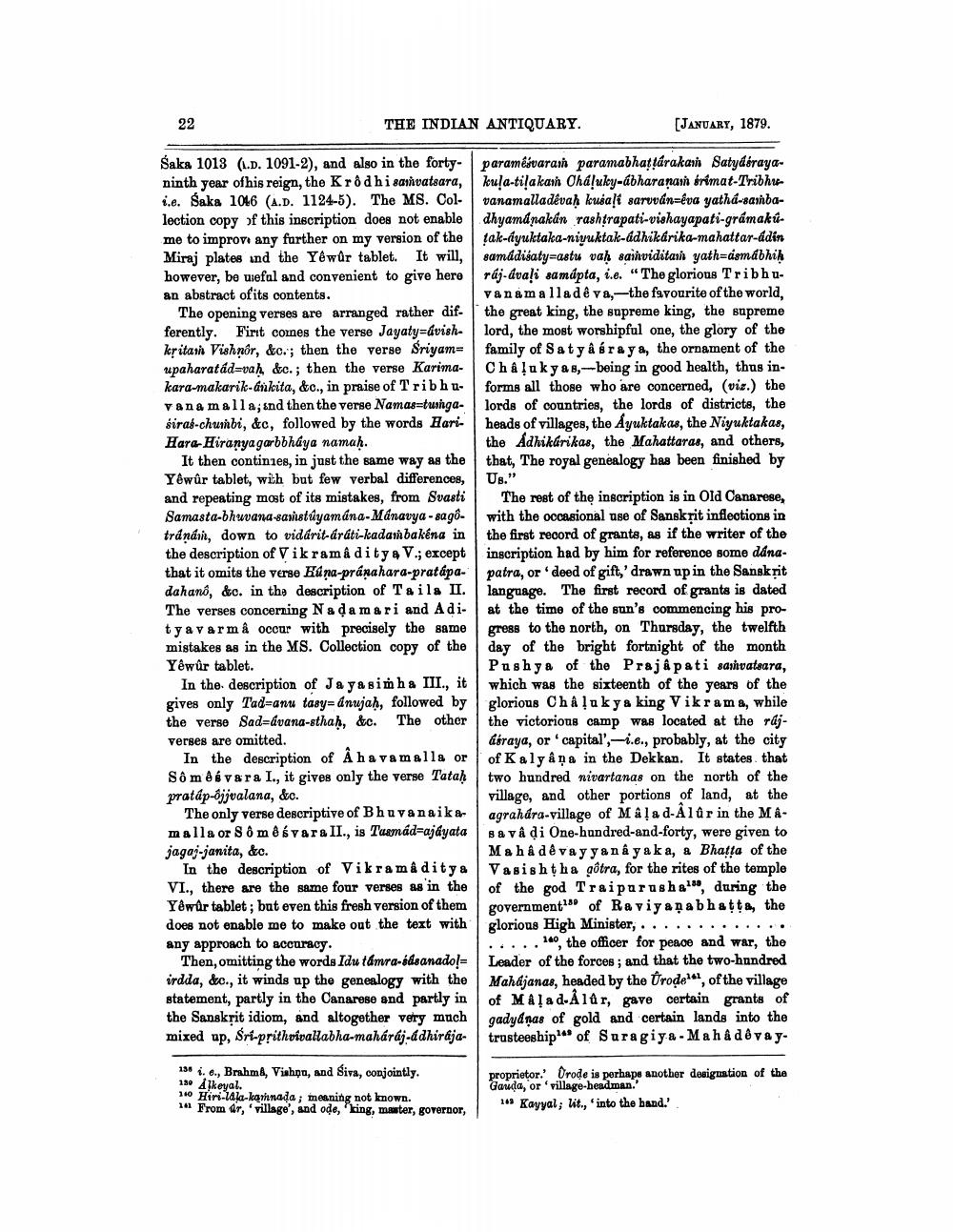________________
22
THE INDIAN ANTIQUARY.
(JANUARY, 1879.
Saka 1013 (A.D. 1091-2), and also in the forty- ninth year ofhis reign, the Krôdhi sanvatsara, i.e. Saka 1046 (A.D. 1124-5). The MS. Collection copy of this inscription does not enable me to improve any further on my version of the Miraj plates and the Yewür tablet. It will, however, be useful and convenient to give here an abstract ofits contents.
The opening verses are arranged rather dif- ferently. First comes the verse Jayaty=dvishkritari Vishnor, &c.; then the verse Sriyam= upaharatád=vah, &c.; then the verse Karimakara-makarik-Ankita, &c., in praise of Tribhuvana malla; and then the verse Namaszturngasiras-chunbi, &c, followed by the words HariHara Hiranya garbbháya namah.
It then continues, in just the same way as the Yêwûr tablet, with but few verbal differences, and repeating most of its mistakes, from Svasti Samasta-bhuvana-samstúyamána-Mánavya - sagô. tranári, down to vidárit-dráti-kadambakéna in the description of Vikramaditya V.; except that it omits the verse Edna-pranahara-pratápadahano, &c. in the description of Taila II. The verses concerning Nadamari and Adi. tya varm & occur with precisely the same mistakes as in the MS. Collection copy of the Yêwûr tablet.
In the description of Jayasinha III., it gives only Tadmanu tasy=dnujah, followed by the verse Sadravana-sthah, &c. The other verses are omitted.
In the description of Ahavamalla or Sô mè e vara I., it gives only the verse Tatah pratáp-ójjvalana, &c.
The only verse descriptive of Bhuvanaikamalla or Sô mê svara II., is Tasmád=ajáyata jagaj-janita, &c.
In the description of Vikramaditya VI., there are the same four verses as in the Yêwûr tablet ; but even this fresh version of them does not enable me to make out the text with any approach to accuracy.
Then, omitting the words Idu támra-edsanadol= irdda, &c., it winds up the genealogy with the statement, partly in the Canarese and partly in the Sanskrit idiom, and altogether very much mixed up, Sri-prithvivallabha-maháráj-adhiraja
paramésvaran paramabhattárakari Satydórayakula-tilakam Chá!uky-ábharanann frímat-Tribhrvanamalladevah kusali saruván=éva yathá-sarnbadhyamdnakan rashtrapati-vishayapati-grámakú
ak-ayuktaka-niyuktak-adhikarika-mahattar-ddin samádibaty=astu vah sainviditar yath=ásmábhik raj-dvali samápta, i.e. "The glorious Tribhuvanamallad ê va,--the favourite of the world, the great king, the supreme king, the supreme lord, the most worshipful one, the glory of the family of Satya éraya, the ornament of the Chalukyas,-being in good health, thus informs all those who are concerned, (viz.) the lords of countries, the lords of districts, the heads of villages, the Ayuktakas, the Niyuktakas, the Adhikarikas, the Mahattaras, and others, that, The royal genealogy has been finished by Us."
The rest of the inscription is in Old Canarese, with the occasional use of Sanskrit inflections in the first record of grants, as if the writer of the inscription had by him for reference some dánapatra, ordeed of gift,' drawn up in the Sanskrit language. The first record of grants is dated at the time of the sun's commencing his progress to the north, on Thursday, the twelfth day of the bright fortnight of the month Pushya of the Prajapati saivatsara, which was the sixteenth of the years of the glorious Chluk ya king Vikrama, while the victorious camp was located at the rájasraya, or capital',-1.6., probably, at the city of Kalyana in the Dekkan. It states that two hundred nivartanas on the north of the village, and other portions of land, at the agrahdra-village of M&!a d-Alûr in the MAsa va di One-hundred-and-forty, were given to Maha dê vay yana yaka, a Bhatta of the Vasishtha gôtra, for the rites of the temple of the god Traiparusha'"during the government of Raviyanabhatta, the glorious High Minister, ............. ..... 10, the officer for peace and war, the Leader of the forces; and that the two-hundred Mahajanas, headed by the Urodel, of the village of Malad-Alûr, gave certain grants of gadydnas of gold and certain lands into the trusteeship of Suragiya - Maha d d va y.
136 1. ., Brahma, Vishộa, and Siva, conjointly,
15° Alkeyal.
proprietor. Orode is perhaps another douignation of the Garda, or village-headman.'
1Kayyal; lit., ' into the band.'
140 Hiri-lala-kannada; meaning not known. 16 From dr, village', and ode, 'king, master, governor,




